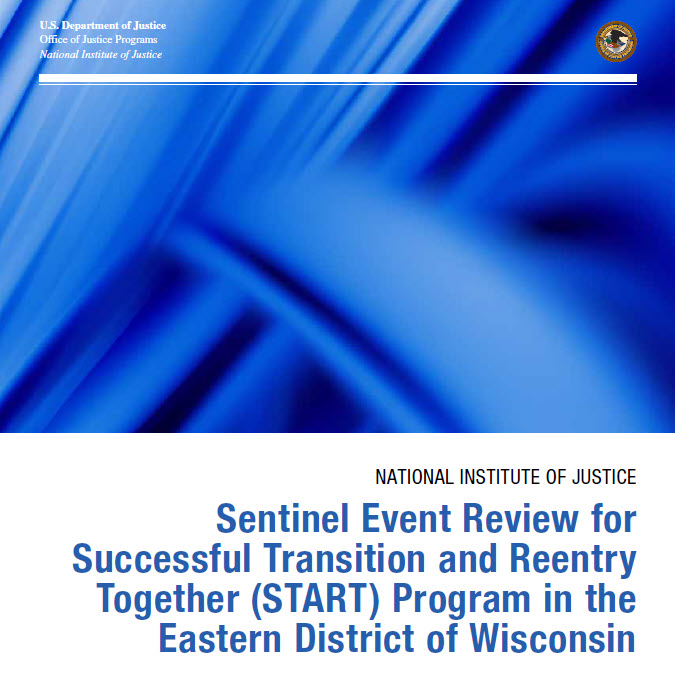Partnering with National Institute of Justice (NIJ), the Successful Transition and Reentry Together (START) program of the Eastern District of Wisconsin undertook a Sentinel Event Review process to systematically review near-misses and unsuccessful cases of reentry and propose recommendations to improve START program outcomes. Sentinel Event Reviews are a formal assessment of the processes that result in the sentinel event. Sentinel event reviews are a formal assessment of the processes that result in the sentinel event. A sentinel event is a significant negative outcome that is likely the result of compound errors, may signal underlying weaknesses in the system or process, and may provide—if properly analyzed and addressed—important keys to strengthening the system and preventing future adverse events or outcomes.
Process
The START SER Team included all START Team members that regularly participate in START, including representatives of the Federal Judiciary, Federal Probation and Parole, Bureau of Prisons (including a Residential Reentry Center), prosecution, and defense. Cases were selected informally in consultation between the START Sentinel Event Review Team and NIJ facilitators. Four reentry cases, two near-misses and two unsuccessful, were selected based on representative indicators of near-miss, yet successful, cases and unsuccessful cases. Biweekly meetings over the course of five months were conducted in a hybrid format with the majority of participants attending in-person, and some attending virtually.
Participants committed to attendance, active participation, information sharing, and willingness to participate in discussions to improve START program outcomes.
Expectations for START Sentinel Event Review Team members also included willingness to participate in interviews with NIJ facilitators, and to assist in the development and refinement of recommendations. NIJ facilitators assisted in launching START Sentinel Event Review, facilitated initial reviews, and provided deliverables, including a ranked list of recommendations, a recommendation ranking tool, an analysis of the current state of START, an updated dataset tool, and a final report.
Results
In order to understand current START program outcomes, guide discussions, and generate recommendations for program improvement goals, the START team shared program data to allow for analysis of program outcomes. This data analysis occurred in parallel with the formal Sentinel Event Review of select cases.
START Program Outcomes: Data Analysis
- Many program participants successfully complete START and have their Term of Supervised Release discharged despite extending the program beyond the minimum 365 days for completion.
- Completion of START was associated with individuals’ Terms of Supervised Release being discharged.
- Most START program terminations occurred during the first phase of the program, suggesting Phase 1 as an optimum target for future improvements.
- Regular data analysis and routine monitoring of program outcomes support the SER process.
SER Outcomes: Recommendations
- Twenty-eight actionable recommendations.
- Recommendations were ranked and prioritized based on impact, evidence, importance, sustainability, resources, and likelihood of implementation.
- Top scoring recommendation: implement behavioral incentives and deterrents that can be ratcheted up or down.
- Other recommendation themes: improving mental health supports, improving information sharing, adapting START program practices, mentoring, education and job training continuity.
The SER process facilitated communication in a high-trust environment, allowing START SER Team members to build on their existing spirit of cooperation to generate insights about the program and how it can be improved.
The emphasis on open data sharing between stakeholders helped reduce the effects of institutional siloing, as START SER Team members were able to benefit from the data and documentation of other members during the SER sessions.
Future
Continuing Sentinel Event Reviews
- Forming a team – Have a champion, the right people and right agencies participating, and practice information sharing.
- Selecting cases – Apply a balanced approach to examine various outcomes and investigate ideas about areas for improvement; involve the whole team and external stakeholders if possible.
- Executing sessions – Promote strong facilitation, shared expectations, information sharing, and active participation.
Prioritizing and Implementing Recommendations
- Individual team members should take ownership and responsibility for specific recommendations.
- Develop a data-driven Implementation Plan that incorporates sustainability.
- Prioritize recommendations with ranking tools and readiness assessments informed by Implementation Science.
Exit survey results from Sentinel Event Review participants suggest broad endorsement of the Sentinel Event Review process as an effective means to generate ideas to improve program outcomes. Collectively, the final report demonstrates that Sentinel Event Reviews can be effectively implemented within a federal probation and parole reentry program and produce actionable recommendations for improvement.


